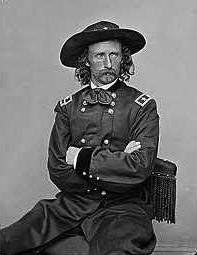Battle of the Little Big Horn
The Battle of the Little Bighorn is one of the most famous battles in American History. In Eastern Montana in the valley of the Little Bighorn River in on June 25 and 26 1876, more than 260 soldiers and attached personnel of the U.S. 7th Cavalry met defeat and death at the hands of Lakota and Cheyenne.
In the battle, the 7th Cavalry lost five companies under Custer, about 210 men. Of the other companies of the regiment, 53 men were killed and 52 wounded. The Indians lost at least 60.
The Sioux and Cheyenne scattered, some going north, some going south. Although the Sioux and Cheyennes won the battle that day but subsequently they lost the war against the military’s effort to end their independent, nomadic way of life. Most of them returned to the reservation and surrendered in the next few years.
Information from the National Park Service.
Barton County Records Clerk Marion Beck checked her e-mail in-box one Monday morning in February and found a message that started like this: “Good evening, Marion, from a very wet southeast England.”
It was from Peter Russell of Bexleyheath, Kent, England, and he had an unusual request. “I am currently putting the finishing touches to a 3,000-word-plus, carefully researched article that will be published by one of the two largest (Gen. George) Custer groups in the U.S. later this year, but there is one important piece of information missing, which is the reason why I am seeking your kind assistance.”
“We rarely get requests from overseas,” Beck said. But, it does happen from time to time.
Russell contacted the Barton County Records Management Department for information from the office of the Barton County Probate Judge dating back to Oct. 3, 1872, about a marriage took place in Dodge City on October 4, 1872. He was looking for dates, names, ages, places of residence and marriage witnesses.
German-born Henry Dose was a trumpeter and an orderly for Gen. George Custer at the Battle of the Little Big Horn on June 25, 1876, in Montana. He was killed along with 209 others under Custer’s immediate command.
According to his Army Pension File, he married Elizabeth Fettis (also a German native) on that day in 1872 at Dodge City. However, the couple applied for their marriage license in Barton County, Beck said.
Under Kansas law, a marriage is registered in the county in which the license was filed, not where the marriage took place.
“We do a lot of work with people studying genealogy,” Beck said. So this query wasn’t difficult to fulfill.
“It’s all on microfilm,” she said. They searched their index by date and found the license. “We e-mailed him a copy of it.”
At the time of Dose’s death, he and his wife had two young children. Elizabeth, then married an Englishman, 1st Sgt. Edward Garlick in November 1876. The Garlicks are reported to have celebrated their golden wedding anniversary in 1926 in Sturgis, S.D.
Russell said he had written several articles on men who served in the 7th Calvary during the Plains Indian Wars, especially those who served with Custer. The English connection is what attracted him to the Dose story.
The article will be published later this year the United States, and Russell said he’d send Beck a copy of it.





